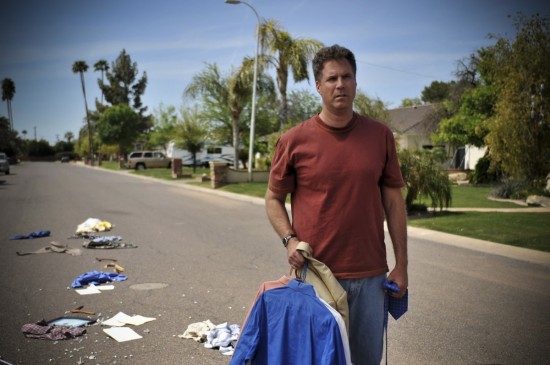Geekscape Movie Reviews: Everything Must Go
Dan Rush’s “Everything Must Go” is based on a short story by Raymond Carver, who previously had his work adapted by Robert Altman in the epic suburban drama “Short Cuts.” Carver’s stories all seem to be infused with a certain flavor of amoral suburban angst, that is somewhere between the saturated melodrama of Douglas Sirk and the gin-soaked poetic delirium of Charles Bukowski. I have read little of his work, I must confess, so I can’t say for sure how close Rush’s film is to its source material. I can say, though, that his film, while dealing with a depressed alcoholic who is trying to rid his life of all its weighty possessions, is not as dark or as hard-edged as it could have been.
Perhaps it was the casting of comedian Will Ferrell in the leads role. Ferrell is known for his self-unaware hysterics, and ego-tastic blowhards, only occasionally venturing into quiet, soulful shlubs and awkward salarymen (as in 2006’s “Stranger than Fiction”). He is genial and affable and unthreatening. This means that his character in “Everything Must Go,” a put-upon alcoholic salesman, is instantly kind of likeable, but doesn’t possess the necessary weight to bring the enterprise to its potential tragic impact. Ferrell has the pathos down, but none of the tragedy. He has the self-pity, but none of the raw villainy required to bring this film any real oomph. As it stands, “Everything Must Go” is quietly affecting, and gently tragic, but not Earth-moving. You can kind of tell that this is the director’s first feature.

Ferrell plays Nick Halsey, a legitimately out-of-control alcoholic who has been coasting at his salesman job for years. At the beginning of the film, he is fired for his more-than-occasional drunkenness, and offered little more than an imitation Swiss Army knife as a consolation. Arriving home, he finds that his wife has changed the locks, left town, and strewn his every belonging out of the front yard. His bank account has been frozen, his telephone is out of service, and his car is repossessed. Drunk, destitute, and without even the most basic faculties, he actively decides to stay in limbo, essentially living on his front lawn, spending what little money he has left on Pabst Blue Ribbon.

He develops some weird regards for the people in his neighborhood, who can see him organizing his stuff during the day, and sleeping in his La-Z-boy chair at night. There is the old friend (Stephen Root) who seems to be having some sort of loving and deviant sex with a younger woman. There is the pretty, pregnant Samantha (Rebecca Hall) who doesn’t seem to grasp just how destitute Nick is. And there’s the professional regard he develops with a neighborhood boy Kenny (Christopher Jordan Wallace), who eventually is hired by Nick to convert his shattered pile of a previous life into the yard sale to end all yard sales.

While Nick is suffering and drunk, and his police detective friend/AA sponsor (Michael Peña) is hastily insisting that he get his shambled life back together, “Everything Must Go” is surprisingly gentle to his haggard protagonist. When he pathetically seeks out an old high school chum (Laura Dern) to sort of self-indulgently while away in some misplaced nostalgia, he is allowed to have his moment. The scenes with Dern are healing and nice. As he sells off his belongings, weans himself off of beer, and shares the profits with Kenny and a close regard for Samantha, Nick races toward a healing oblivion.
The actual oblivion is, perhaps, more romantic than it should have been, and Nick’s deliberate erasure of himself from the Grid could have felt more cathartic, but “Everything Must Go” is such an earnest effort that it’s hard not to get hooked for long passages. I left a trifle unsatisfied, but I did get the feeling that Ferrell, just like Nick, will eventually become the serious, pure worker that he so desperately wants to be.
